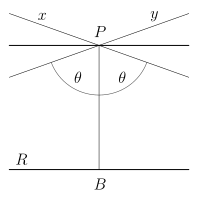Limiting parallel

In neutral or absolute geometry, and in hyperbolic geometry, there may be many lines parallel to a given line through a point not on line ; however, in the plane, two parallels may be closer to than all others (one in each direction of ).
Thus it is useful to make a new definition concerning parallels in neutral geometry. If there are closest parallels to a given line they are known as the limiting parallel, asymptotic parallel or horoparallel (horo from Greek: ὅριον — border).
For rays, the relation of limiting parallel is an equivalence relation, which includes the equivalence relation of being coterminal.
If, in a hyperbolic triangle, the pairs of sides are limiting parallel, then the triangle is an ideal triangle.
Definition

A ray is a limiting parallel to a ray if they are coterminal or if they lie on distinct lines not equal to the line , they do not meet, and every ray in the interior of the angle meets the ray .[1]
Properties
Distinct lines carrying limiting parallel rays do not meet.
Proof
Suppose that the lines carrying distinct parallel rays met. By definition they cannot meet on the side of which either is on. Then they must meet on the side of opposite to , call this point . Thus . Contradiction.
See also
- horocycle, In Hyperbolic geometry a curve whose normals are limiting parallels
- angle of parallelism
References
- ^ Hartshorne, Robin (2000). Geometry: Euclid and beyond (Corr. 2nd print. ed.). New York, NY [u.a.]: Springer. ISBN 978-0-387-98650-0.




















